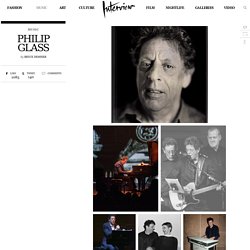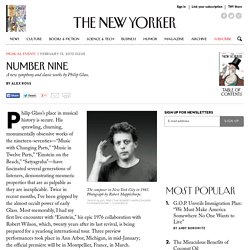

Philip Glass. GLASS: That group goes back more than 40 years, and some of the original players are still there.

Jon Gibson and myself are original players. But Michael Riesman was there almost from the beginning. We consider a recent member someone who has played with us 10 years. [laughs] DESSNER: Why did you start your own ensemble? GLASS: Well, it was out of total necessity. DESSNER: I didn't realize she was part of it. GLASS: But mostly we were considered to be, at best, idiot savants of some kind. DESSNER: So you were writing and performing your own music, and then, at a certain point, you started writing for larger forms, like operas. GLASS: That came up after Einstein. DESSNER: And was that Satyagraha? GLASS: Satyagraha was the end of my day jobs.
DESSNER: I think about that in terms of the work that you have done—what you said about how you came back from Europe and there really wasn't anyone to play your music. DESSNER: At the Music Hall of Williamsburg. DESSNER: The middle-early years. Philip Glass: Welcome. A guide to Philip Glass's music. Number Nine - The New Yorker. Philip Glass’s place in musical history is secure.

His sprawling, churning, monumentally obsessive works of the nineteen-seventies—“Music with Changing Parts,” “Music in Twelve Parts,” “Einstein on the Beach,” “Satyagraha”—have fascinated several generations of listeners, demonstrating mesmeric properties that are as palpable as they are inexplicable. Twice in recent months, I’ve been gripped by the almost occult power of early Glass. Most memorably, I had my first live encounter with “Einstein,” his epic 1976 collaboration with Robert Wilson, which, twenty years after its last revival, is being prepared for a yearlong international tour.
Three preview performances took place in Ann Arbor, Michigan, in mid-January; the official première will be in Montpellier, France, in March. Accounts of earlier stagings of “Einstein” primed me for transcendence; more than a few friends had told me that the work had changed their lives. Further birthday celebrations will offer loftier achievements. Philip Glass: From Glassworks to Glassfest - Features - Classical - The Independent. Now 77, Glass is still hard at work, not only composing, but also performing.

This week, Bristol’s top concert venues present Glassfest, a weekend of talks, performances and film devoted his work. Glass himself is at the piano, playing his own music in a retrospective programme with his long-established Philip Glass Ensemble, which then tours to Manchester, Basingstoke and Cambridge. Meanwhile, Music Theatre Wales is on the road with his latest opera, The Trial. “I started my ensemble when I came back from studying in Europe in the late Sixties, because nobody else would play the music,” Glass reminisces. “I called some friends I went to school with and we put a group together.”
Partly, too, he does it because he can. Did he just say “considering working into your nineties”? “For future composers,” Glass adds, “the money will be in performing and in the way music is used commercially. Only after its success was he able to devote himself entirely to music.